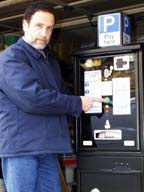Before the town decided to install a new electronic meter system in the Centre Avenue municipal parking lot, parking there was something of an adventure.
Although fully metered, the lot had two rows. Two meter heads sat on a single pole at the end of each parking spot. With the numbers on the meters and the spaces faded over time, finding which spot belonged to which meter might well have taken an archeologist. Inevitably, people put the their coins into the wrong meter and returned later to find their cars ticketed.
With the Metric Parking System installed there in late November, all of that changes.
Instead of parking meters being posted on every spot, the entire parking lot will have two machines, complete with a computerized monitoring system that will keep track of which spot has been paid for and for how long, thus eliminating the old confusion.
“People pull into a spot, then walk over to the machine, put their money in, press the green button, and take their receipt,” said Richard Damato, the town electrician, who doubles as the unofficial commissioner of the town’s parking lots.
Damato’s duties in this regard will be to maintain the machines and reinstall paper rolls that supply receipts.
“I won’t be collecting the money,” he said, noting that unlike collections of the past, which often saw men or women moving with a heavy sack of coins, the cash from these machines is taken out in a sealed metal box from a secure section in the lower part of the machine.
“The person collecting doesn’t have the key [to the box.] Only the bank does,” Damato said, although he can tell exactly how much should be in the box by checking the machine’s calculations.
The charge for parking is 25 cents per hour. Unlike many of the meters set up in other parts of town, this machine supplies long-term parking for commuter traffic. This was designed to keep people from other parts of Secaucus from using spaces in the central business district (about a block away) in order to catch a bus to Manhattan. The machine will allow someone to pay for 12 hours parking at a time – the same as the old meters provided.
“People will still be able to park there and go to New York,” said Town Administrator Anthony Iacono. Metered parking will run from 9 a.m. to 6 p.m.
This is the second lot in town that uses the computerized metering system. It’s a relatively new concept for American parking facilities, although according to Mayor Dennis Elwell, it is extensively used in other countries.
Although each machine has a hefty price tag of nearly $30,000, the cost of purchasing and maintaining older style meters can be even greater.
“They are expensive to buy and even more expensive to maintain,” Elwell said. “The older style meters break down a lot.”
After viewing operations of the computerized metering system in several other towns in New Jersey, Elwell and members of the Town Council installed one in the North End parking lot last year.
“We found that the system works well,” he said.
The advantages
Town officials, of course, will not let the older meters formerly in the lot go to waste. In an ordinance passed at the Nov. 14 council meeting, they authorized these meters to be moved to sections of Wilson and First Avenues, an area where commuters have previously parked free.
The computerized machines – manufactured in England – allow meter readers to monitor the use of the parking lot better, and to eliminate any confusion as to which spot they are paying for when they pull in. Each space is marked with a number. People park, go to one of the two machines, put their money in for the length of time they want to spend there, push in the space number, and get a receipt. Since the two machines at the Centre Avenue lot “talk to each other,” a meter reader simply has to check either one to determine which spots have been paid for and how long. Accidental ticketing – the kind of which some people suffered under the previous system – is much less likely.
“If you go to the machine and punch in the number of a space that’s already taken, the machine will reject your money,” Damato said.
If you get a ticket on a space you paid for, you also have a receipt to prove it – and since tickets will have the time when they are issued, the receipt can be valuable in fighting the ticket in court.
Service to the machines is a relatively easy process. Since most of the machine’s working equipment involves computer parts, if something goes wrong, Damato simply goes in and replaces the errant card.
Although set up to receive coins at the moment, the machine can also be activated to accept credit cards.
“The town has not yet decided to use that option,” Damato said.
The valuable new computerized metering machines could be the target of unscrupulous thieves, who might seek to make off with whole device rather than exercise the fruitless endeavor of attempting to break in for its money.
“These machines are very heavy,” Damato said. “So no one is just going to come in here and make off with one. But just in case, they are bolted to the ground – not just on the outside of the machine, but also inside a sealed section.”
